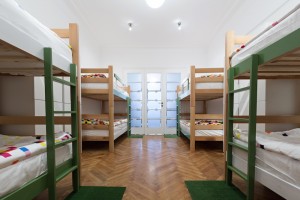 There are plenty of things students worry about as they leave home for college, but housing shouldn’t be one of them. Schools provide a number of options for students, and can assist all students in finding both on and off campus housing.
There are plenty of things students worry about as they leave home for college, but housing shouldn’t be one of them. Schools provide a number of options for students, and can assist all students in finding both on and off campus housing.
Freshman and sophomores commonly choose to live on campus, in either dormitories or greek housing; while upperclassmen often choose to live in off-campus apartments or houses. There are a number of factors that affect where students choose to live, and it’s important to evaluate your options carefully. Our guide below will help you find the right housing situation for your needs and preferences.
Living on Campus
Approximately 2.54 million students live on-campus, and with good reason. There are a number of perks to campus housing: you’re close to the school social scene, within walking distance of academic facilities, and you don’t have to pay utilities. Below we explain some of the most common types of on-campus student housing, as well as their advantages and disadvantages.
| Pros | Cons |
|---|---|
| It’s easy to meet people and make friends. | Living on campus is expensive. The average cost of room and board for 2015-2016 ranges from $10,138 for public institutions to $11,516 for private colleges and universities. |
| Classrooms and meeting facilities are within walking distance of your room. | You don’t always have a lot of privacy, especially if you share a room with several people. |
| Financial aid may cover the cost of room and board. | It’s difficult to focus on school because there is always something going on. |
| Staff members plan games and activities for resident students. | Residence halls can get noisy at night and on the weekends. |
| Housekeepers maintain common areas. | If you have dietary restrictions, it may be difficult to find something to eat in the campus cafeteria. |
| Residents have access to study groups and other educational resources. | You may have to share a bathroom. |
| Many on-campus residences have security personnel. | Some dorm rooms are small, limiting the amount of storage space. |
Dormitories
Dorms are by far the most common  option for students living on campus. Students in dorms often have to share their room with two, three, or four other people. Although some dorms have private bathrooms in each room, many have one shared bathroom per floor.
option for students living on campus. Students in dorms often have to share their room with two, three, or four other people. Although some dorms have private bathrooms in each room, many have one shared bathroom per floor.
Greek Life
In the United States, there are about nine million fraternity and sorority members. Approximately 800 campuses have on-site Greek housing, with each house accommodating anywhere from 20 to 100 members.
Student Housing Cooperatives
Student housing cooperatives, often called co-ops, are owned and maintained by students. Living in a co-op is less expensive than living in an apartment or single-family house, as all residents share expenses.
Family-style Living
Some colleges offer family-style living to married couples and single parents. Family-style housing usually consists of on-campus apartments or townhouses, providing residents privacy and easy access to classroom buildings.
Living Off Campus
Some students may grow tired of the campus lifestyle or desire to live more independently; campus living isn’t for everyone. Luckily, many rental agencies understand there is a large market for affordable housing within a reasonable distance of college campuses, meaning there are numerous options for off campus student renters.
| Pros | Cons |
|---|---|
| You have more privacy. | You may have to sign a one-year lease. |
| You get to choose your roommate. | You have to pay utility bills. |
| You don’t have to eat at the campus cafeteria every day. | You have to travel to campus to use the library or meet with professors. |
| There aren’t as many rules to follow. | If you travel to campus for a study session, you have to carry all of your books and supplies with you. |
| It’s a good way to gain experience living on your own. | You may have to pay a security deposit before you can move in. |
| Private homes typically have more amenities than dorms. | More cleaning responsibilities when you live on your own. |
| You have more space to yourself. | It may be difficult to make friends if you don’t spend a lot of time on campus. |
| Paying bills helps you build credit. | You may need to find someone to sublet your apartment at the end of the year. |
Before you sign a lease, you need to find housing in a location you like, at a price you can afford. Read on to learn more about the factors you should evaluate as you consider where to live.
Location
Finding the right neighborhood depends on several factors: your budget, how far you are willing to commute, and your preferred type of housing. Before beginning your housing search, make a list of neighborhoods that match your criteria. If you haven’t already, visit each neighborhood to get a feel for what living there would be like.
Price
A budget is crucial to setting realistic expectations of what you can afford. Average monthly rent varies widely from state-to-state and city-to-city. Students pay a whole lot more for rent in, say, San Francisco than they do in Idaho. Utility prices also vary between locations.
Type of Housing
Once you have a short list of suitable neighborhoods and a budget, you should decide whether you prefer living in a house or an apartment. Houses are usually larger, affording you the option of living with several roommates if you need help paying the rent. They may also be cheaper, if you can find an arrangement suitable for a number of people. If you prefer to live alone, you will probably want to live in an apartment instead. With a small apartment, there is less cleaning to do, and you don’t have to worry about noisy roommates.
Living Situation
Splitting expenses with roommates is a good way to limit your housing costs. If you rent a large house, you may be able to live with several roommates, reducing your living expenses considerably. If you are a sociable person, it’s also nice to have roommates around when you get home from a long day.
One of the drawbacks to living with roommates is the lack of privacy. You may have to share a bathroom or compromise when it comes to hosting guests. It’s also harder to control the noise level in your home if you live with other people.
If you decide to live with a roommate, follow these tips to help you choose the right person.
- Try to find someone whose daily habits are similar to yours.
- Don’t move in with someone who has a bad reputation or a negative attitude.
- Move in with friends. You’ll get along with friends better than strangers, and it’ll be fun having friends to hang out with when you’re done with class.
- If you can’t move in with a buddy, contact any potential roommate’s current or previous landlord. Make sure the person has a history of paying rent and utilities on time.
- Conduct a background check before moving in with someone you’ve never met.
Leasing
Most landlords require tenants to sign a one-year lease, but you may be able to negotiate a month-to-month or six-month deal instead. Shorter leases are ideal if you aren’t sure of your plans or if you don’t want to be locked into the same place for a year or more. However, landlords typically charge higher rents to tenants who are unwilling to make to a one-year commitment.
Before you sign a lease, ask the landlord if you have the option of renewing the lease at the end of the original term. You should also check if they allow subletting, an arrangement where tenants rent their apartment to someone else. If you have to move before your lease ends, it’s nice to have the option of subletting to someone else instead of continuing to pay rent.
Advice for First-Time Renters
For many students, this is their first experience renting a house or apartment. Below, we’ve compiled a quick overview of what you should learn about your unit and your landlord before putting pen to paper on a lease.
Costs
Your base monthly expenses include rent, water, sewage, gas, and electricity. Generally, you will be billed separately for rent and utilities. Beyond these costs, you also have to budget for food and beverages. Some renters also pay for cable, internet access, and other monthly services. Make sure you can comfortably pay all of your bills, and set aside a bit of extra money for the winter, when you’ll use your utilities more often.
Location
Location is crucial, particularly if you don’t have your own vehicle. If you don’t have a car, you need to make sure you can get to campus quickly and conveniently. You will also want to be within walking distance of a grocery store, if possible. Before viewing a house or an apartment, research crime statistics in the area; you don’t want to accidentally move into a rough neighborhood.
Important Questions to Ask
As you tour a house or apartment, ask your landlord several questions. Before signing a lease, make sure you know the following:
- Who is responsible for lawn care and maintenance work?
- What is the total square footage of the apartment or house you are renting?
- How much of a security deposit is required?
- Does the landlord live close to the building?
- How long does it typically take to refund a security deposit when a tenant moves out?
- If you move in or out in the middle of the month, will the landlord prorate your rent for that month?
- When is the building supervisor available to make repairs?
- Who should you contact in the event of an emergency, such as a broken furnace or lack of water?
- If the landlord is not available, who should you contact for repairs?
- Does the landlord accept checks or debit cards for rent payments?
Renter’s Insurance
When you move into a rental, you’ll need to buy renter’s insurance. Insurance provides coverage in case your belongings are stolen or damaged, or if something happens to your residence, such as a flood. Some policies also cover you in the event someone is injured while visiting your home. Prices vary based on the amount of coverage purchased, but the average premium is $12 per month for $30,000 of property coverage.
Avoiding Scams
 Rental scams are unfortunately common. Some scammers collect security deposits for properties they do not own, while others leverage rental property to steal personal and financial information from tenants. As you search for housing, do your homework on your landlord. Be wary of any red flags, such as:
Rental scams are unfortunately common. Some scammers collect security deposits for properties they do not own, while others leverage rental property to steal personal and financial information from tenants. As you search for housing, do your homework on your landlord. Be wary of any red flags, such as:
- Someone asks you to wire money via Western Union or MoneyGram.
- The landlord lives in a foreign country. Be especially wary if the person claims to be a foreign ambassador or missionary.
- Someone asks you for your social security number or driver’s license number. Don’t give out personal information unless you are working with a legitimate rental company or established landlord.
- Your potential landlord sends you emails laden with grammatical errors or misspellings.
Ways to Save While Living Off Campus
Once you are settled in your off campus living space, there are a couple tips you can learn to help save money in the long run. Check out this small list of money saving advice, and be sure to keep an eye on your spending to see where you may be able to cut back if your bank account is feeling tight.
| Instead of… | You should… |
|---|---|
| Eating out | Learn to cook meals at home |
| Paying for cable | Pay for internet only and use it to stream videos or to play games |
| Letting the water run while you do dishes | Fill the sink with a few inches of water and shut off the faucet until you are ready to rinse |
| Paying full price for groceries | Use coupons and shop around |
| Buying a car and paying for insurance | Walk, bike or use public transportation |
| Purchasing books and DVDs | Check them out from the library |
| Having an expensive phone plan | Buy a pay-as-you-go phone |
| Running the dryer several times a week | Purchase a drying rack to air-dry clothing |
Additional Resources for Students
- Rent.com: Find housing near your college.
- 31 Money-Saving Tricks for College Students: Learn how to save money while you’re in school.
- What Does Renter’s Insurance Cover? Find out what your rental insurance policy actually covers.
- How to Get the Lease When You’re a College Student: Learn how to impress potential landlords and get the rental you really want.
- Cost-of-Living Reality Check: Discover how much it costs to live on your own.
- What’s Your Criteria for Choosing a Roommate?: Review these questions before you pick a roommate.



